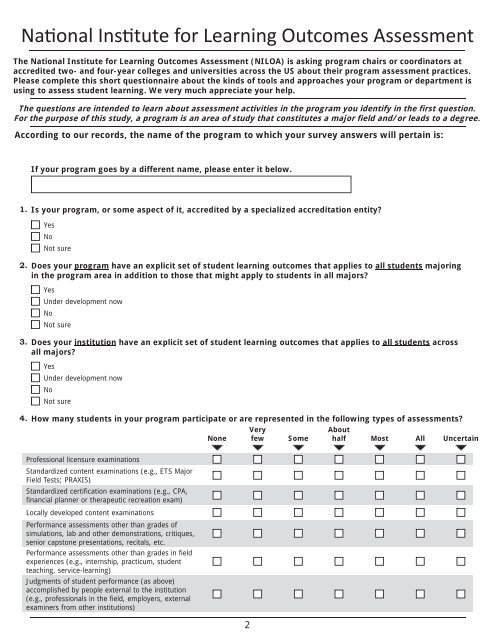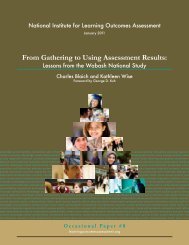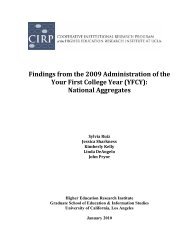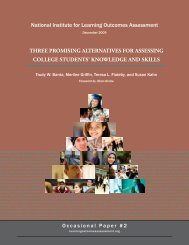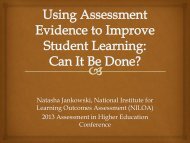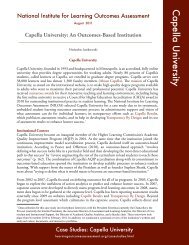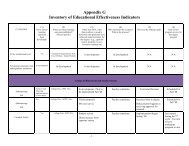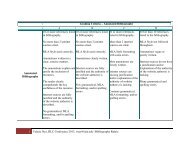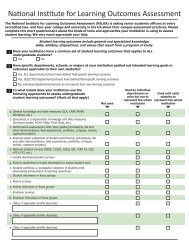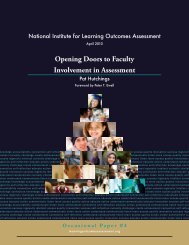2010 Survey Questionnaire - National Institute for Learning ...
2010 Survey Questionnaire - National Institute for Learning ...
2010 Survey Questionnaire - National Institute for Learning ...
Create successful ePaper yourself
Turn your PDF publications into a flip-book with our unique Google optimized e-Paper software.
<strong>National</strong> <strong>Institute</strong> <strong>for</strong> <strong>Learning</strong> Outcomes Assessment<br />
The <strong>National</strong> <strong>Institute</strong> <strong>for</strong> <strong>Learning</strong> Outcomes Assessment (NILOA) is asking program chairs or coordinators at<br />
accredited two- and four-year colleges and universities across the US about their program assessment practices.<br />
Please complete this short questionnaire about the kinds of tools and approaches your program or department is<br />
using to assess student learning. We very much appreciate your help.<br />
The questions are intended to learn about assessment activities in the program you identify in the first question.<br />
For the purpose of this study, a program is an area of study that constitutes a major field and/or leads to a degree.<br />
According to our records, the name of the program to which your survey answers will pertain is:<br />
If your program goes by a different name, please enter it below.<br />
1. Is your program, or some aspect of it, accredited by a specialized accreditation entity?<br />
Yes<br />
No<br />
Not sure<br />
2. Does your program have an explicit set of student learning outcomes that applies to all students majoring<br />
in the program area in addition to those that might apply to students in all majors?<br />
Yes<br />
Under development now<br />
No<br />
Not sure<br />
3. Does your institution have an explicit set of student learning outcomes that applies to all students across<br />
all majors?<br />
Yes<br />
Under development now<br />
No<br />
Not sure<br />
4. How many students in your program participate or are represented in the following types of assessments?<br />
None<br />
Very<br />
few<br />
Some<br />
About<br />
half<br />
Most<br />
All<br />
Uncertain<br />
Professional licensure examinations<br />
Standardized content examinations (e.g., ETS Major<br />
Field Tests; PRAXIS)<br />
Standardized certification examinations (e.g., CPA,<br />
financial planner or therapeutic recreation exam)<br />
Locally developed content examinations<br />
Per<strong>for</strong>mance assessments other than grades of<br />
simulations, lab and other demonstrations, critiques,<br />
senior capstone presentations, recitals, etc.<br />
Per<strong>for</strong>mance assessments other than grades in field<br />
experiences (e.g., internship, practicum, student<br />
teaching, service-learning)<br />
Judgments of student per<strong>for</strong>mance (as above)<br />
accomplished by people external to the institution<br />
(e.g., professionals in the field, employers, external<br />
examiners from other institutions)<br />
2
4. Cont’d: How many students in your program participate or are represented in the following types<br />
of assessments?<br />
None<br />
Very<br />
few<br />
Some<br />
About<br />
half<br />
Most<br />
All<br />
Uncertain<br />
Capstone course<br />
Comprehensive exam (oral or written)<br />
Culminating project or demonstration<br />
Rubrics to assess student work<br />
Portfolios (a purposeful collection of student work<br />
intended to demonstrate achievement of learning<br />
objectives)<br />
<strong>National</strong> student surveys (e.g., NSSE, CCSSE, SENSE,<br />
CSEQ, SSI, CIRP FS, CSS, YFCY, FYI)<br />
Locally-developed student surveys<br />
Student interviews or focus groups<br />
Alumni surveys<br />
Alumni interviews or focus groups<br />
Employer surveys<br />
Employer interviews or focus groups<br />
Results from institution-wide assessments broken<br />
out <strong>for</strong> students in your program (e.g., CLA, CAAP,<br />
MAPP, Work Keys)<br />
Results from institution-wide surveys broken out<br />
<strong>for</strong> students in your program (e.g., NSSE/CCSSE,<br />
Student Satisfaction Inventory)<br />
Other, if applicable (briefly describe):<br />
5. To what extent has your program used student learning outcomes results <strong>for</strong> each of the following?<br />
Not<br />
at all<br />
Some<br />
Quite<br />
a bit<br />
Very<br />
much<br />
Preparing self-studies or reports <strong>for</strong> programmatic or specialized accreditation<br />
Preparing self-studies or reports <strong>for</strong> institutional accreditation<br />
Preparing self-studies or reports <strong>for</strong> program review<br />
Revising program learning goals<br />
Determining student readiness <strong>for</strong> learning in the English language<br />
Determining student readiness <strong>for</strong> college-level work<br />
Determining student readiness <strong>for</strong> admission to the program or major<br />
Determining student readiness <strong>for</strong> later courses in the program or major<br />
Reviewing or revising program or department curriculum<br />
Improving instruction or pedagogy<br />
Evaluating faculty and staff per<strong>for</strong>mance<br />
Evaluating overall program or department per<strong>for</strong>mance<br />
In<strong>for</strong>ming program or department planning<br />
Determining classroom and instructional equipment needs<br />
Supporting budget requests to central administration<br />
Other, if applicable (briefly describe):<br />
3
6. How important are the following factors in prompting your program to assess student learning outcomes?<br />
Not<br />
important<br />
Minor<br />
importance<br />
Moderate<br />
importance<br />
High<br />
importance<br />
<strong>National</strong> calls <strong>for</strong> accountability and/or transparency<br />
Governing or coordinating board mandate<br />
State board mandate<br />
Legislative mandate<br />
Institutional accreditation requirement<br />
Specialized or programmatic accreditation requirements<br />
Professional or disciplinary association initiative<br />
Internal program review requirement<br />
Program commitment to improve undergraduate education (e.g., in strategic plan)<br />
Institutional commitment to improve undergraduate education (e.g., in<br />
strategic plan)<br />
Faculty or staff interest in improving student learning<br />
Other, if applicable (briefly describe):<br />
7. Is a person in your program responsible <strong>for</strong> coordinating or implementing student learning<br />
outcomes assessment?<br />
Yes, (full-time on assessment) (Go to question 8.)<br />
Yes, (part-time on assessment) (Go to question 8.)<br />
No (Go to question 9.)<br />
8. If Yes, is that person a:<br />
Tenured faculty member<br />
Not tenured faculty member<br />
Non-tenure track faculty member<br />
Staff member<br />
9. Which of the following accurately describe this position? (Select all that apply.)<br />
Receives one course equivalent teaching load reduction<br />
Receives more than one course equivalent teaching load reduction<br />
Other (please specify):<br />
10. Does your program have a committee or group responsible <strong>for</strong> coordinating and implementing<br />
student learning outcomes assessment?<br />
Yes<br />
No<br />
11. How many of your program faculty and staff are involved in student learning outcomes assessment<br />
activities beyond grading?<br />
All<br />
Most<br />
About half<br />
Some<br />
Very few<br />
None<br />
Uncertain<br />
4
12. Does your program generate annual reports based on its student learning outcomes assessment<br />
activities?<br />
Yes (Go to question 13.)<br />
No (Go to question 14.)<br />
13. Who receives these reports? (Select all that apply.)<br />
Program faculty<br />
Program/department chairperson<br />
Dean of school/college<br />
Provost/chief academic officer<br />
Institutional effectiveness/assessment office<br />
Institutional effectiveness/assessment committee<br />
Institution’s governing board<br />
State board or agency<br />
Prospective students<br />
Currently enrolled students<br />
Alumni<br />
Other (please specify):<br />
14. Which of the following would be helpful <strong>for</strong> your program to more effectively assess student learning<br />
outcomes? (Select all that apply.)<br />
A More faculty release time to coordinate student learning outcomes assessment activities<br />
B Some or additional stipends <strong>for</strong> faculty assessment leaders<br />
C A program or department assessment committee, if not now in place<br />
D Full-time assessment position in your program or department, if not now in place<br />
E Some or more external consultants<br />
F More faculty involvement in assessment<br />
G Stronger support from the institution’s leaders<br />
H Better tests or measures of student learning outcomes<br />
I More in<strong>for</strong>mation about policies and practices of programs like yours at other institutions<br />
J More in<strong>for</strong>mation about assessment tools and approaches<br />
K Greater faculty/staff expertise in assessment methodology among program faculty<br />
L More help with assessment tools and approaches from institutional resources (e.g., institutional assessment office,<br />
teaching/learning center)<br />
M More financial resources to pay <strong>for</strong> assessment instruments, etc.<br />
N More recognition of faculty and staff members doing good work in assessment<br />
O Other, if applicable (briefly describe):<br />
15. From the list of factors above, please select the three that would be most helpful to your program by<br />
entering the letter corresponding to the selected factor <strong>for</strong> each response below:<br />
Most helpful<br />
Second most helpful<br />
Third most helpful<br />
5
16. What changes - if any - have been made in your program policies and practices in response to assessment<br />
results to improve student learning? (Select all that apply.)<br />
None (Go to question 17.)<br />
Change in course or program curriculum (briefly describe):<br />
Change in teaching practice (briefly describe):<br />
Change in academic policy (briefly describe):<br />
Change in assessment practice (briefly describe):<br />
Other change (briefly describe):<br />
6
17. Is there a dedicated program budget line <strong>for</strong> student learning outcomes assessment?<br />
Yes (Go to question 18.)<br />
No (Go to question 19.)<br />
Not sure (Go to question 19.)<br />
18.About how much is your dedicated program budget?<br />
$<br />
19. Compared to programs in your field or discipline at other institutions with respect to assessing student<br />
learning outcomes, is your program:<br />
One of the most active<br />
In the top third or so<br />
About average<br />
Below average<br />
Unable to determine<br />
To our knowledge, this program is not offered at any other institution (Go to question 21.)<br />
20. Compared to programs in your field or discipline at other institutions with respect to using the results of<br />
student learning outcomes assessment, is your program:<br />
One of the most active<br />
In the top third or so<br />
About average<br />
Below average<br />
Unable to determine<br />
21. Please enter the name and e-mail of the person who completed this questionnaire along with the other<br />
requested in<strong>for</strong>mation.<br />
Name:<br />
Title:<br />
E-mail:<br />
Name of program:<br />
Name of specialized or program accreditation(s) <strong>for</strong> your program (list all that apply, if any):<br />
Name of institution:<br />
7
22. May we contact you to obtain additional in<strong>for</strong>mation about what your program is doing in terms of student<br />
learning outcomes assessment?<br />
Yes<br />
No<br />
23. What else do you think we should know about student learning outcomes assessment in your program?<br />
THANKS FOR YOUR HELP!<br />
After completing the survey, please put it in the enclosed postage-paid envelope and deposit it in any U.S. Postal<br />
Service mailbox. Questions or comments? Contact the Project Manager Staci Provezis (sprovez2@illinois.edu),<br />
Stan Ikenberry (stanike@uiuc.edu), or George Kuh (kuh@indiana.edu). You can find out more about NILOA at<br />
www.<strong>Learning</strong>OutcomesAssessment.org. Copyright © <strong>2010</strong> Indiana University.<br />
8


